UNIT 12 INNOVATION LESSON 1 Scientific Breakthroughs课件1(共38张PPT,内镶嵌视频)-高中英语北师大版(2019)选择性必修第四册
文档属性
| 名称 | UNIT 12 INNOVATION LESSON 1 Scientific Breakthroughs课件1(共38张PPT,内镶嵌视频)-高中英语北师大版(2019)选择性必修第四册 |
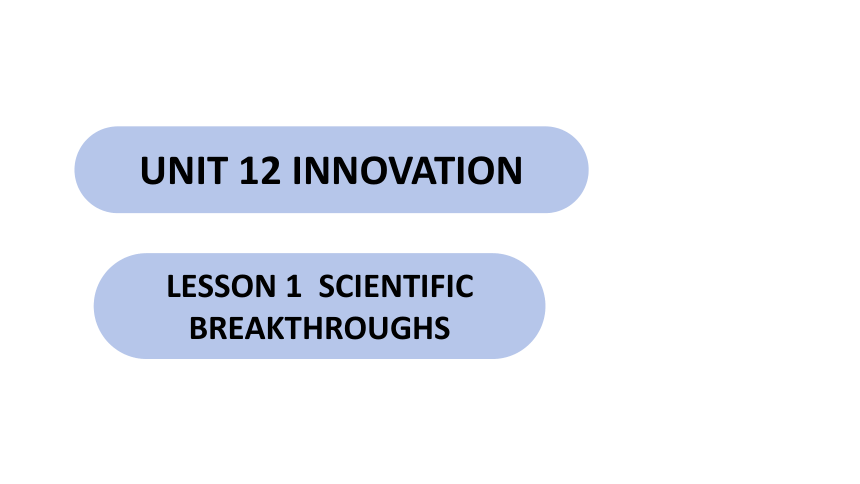
|
|
| 格式 | pptx | ||
| 文件大小 | 190.4MB | ||
| 资源类型 | 教案 | ||
| 版本资源 | 北师大版(2019) | ||
| 科目 | 英语 | ||
| 更新时间 | 2025-04-01 19:53:23 | ||
图片预览

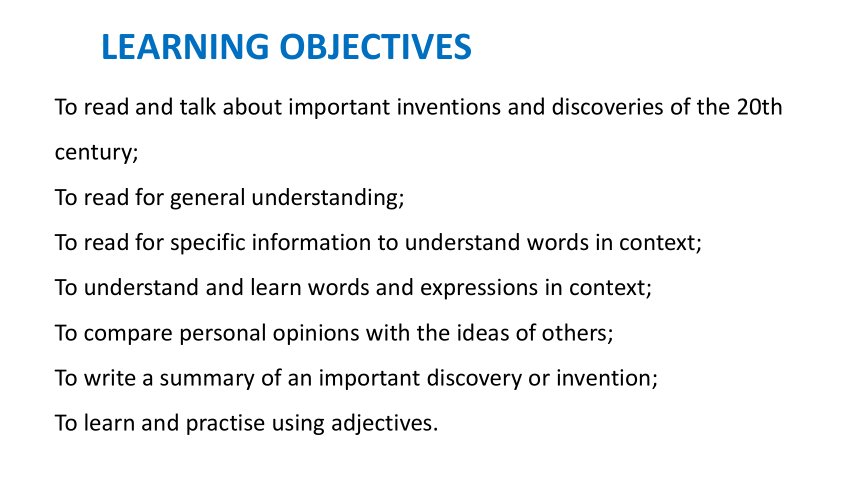
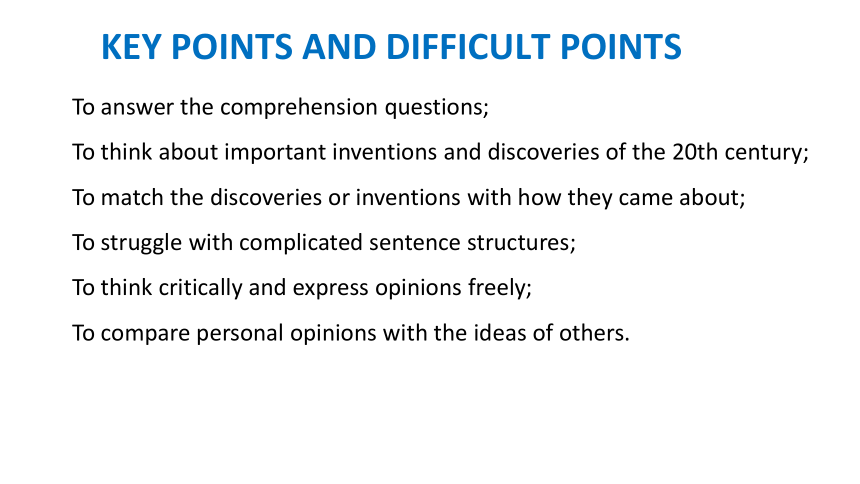
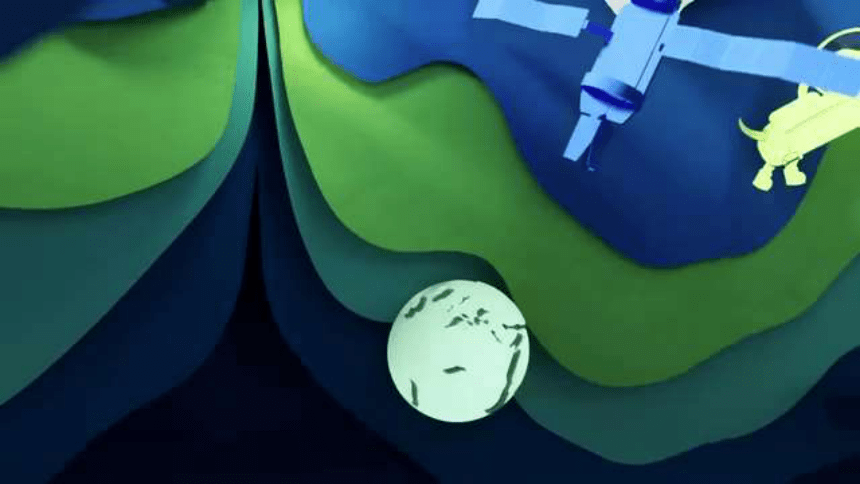
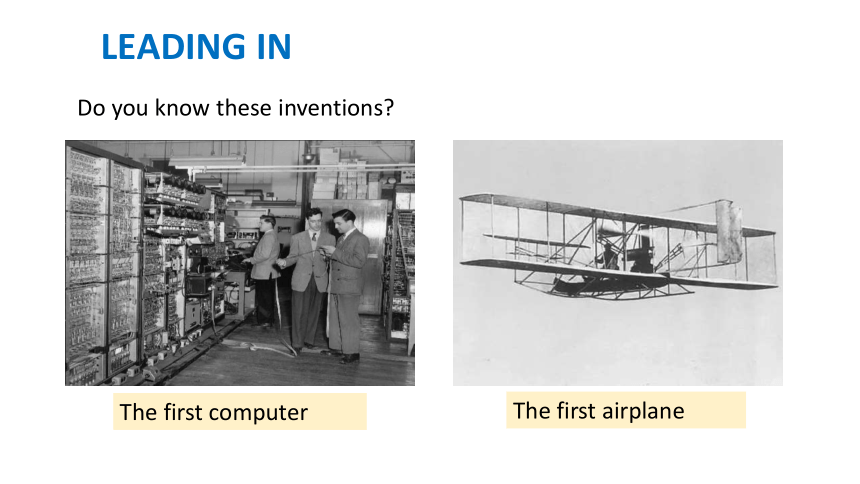
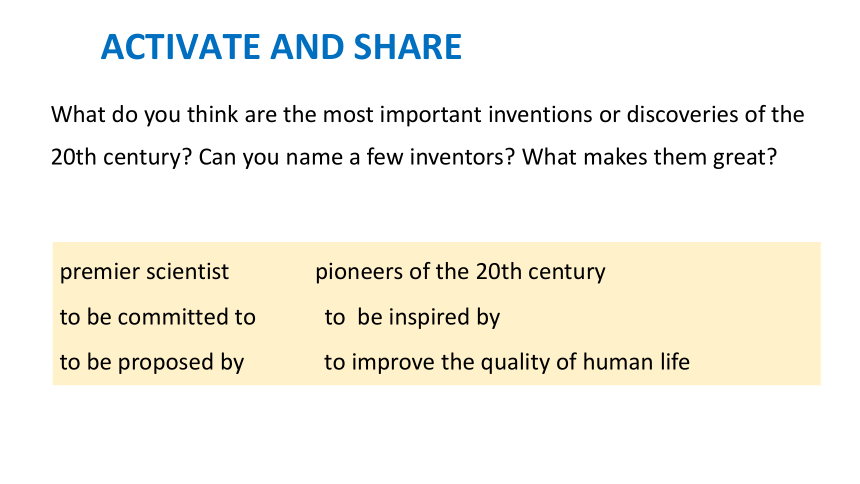
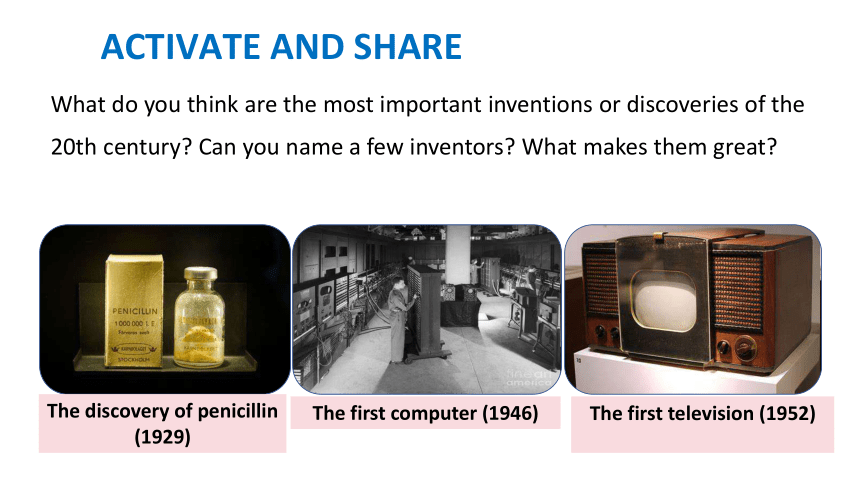
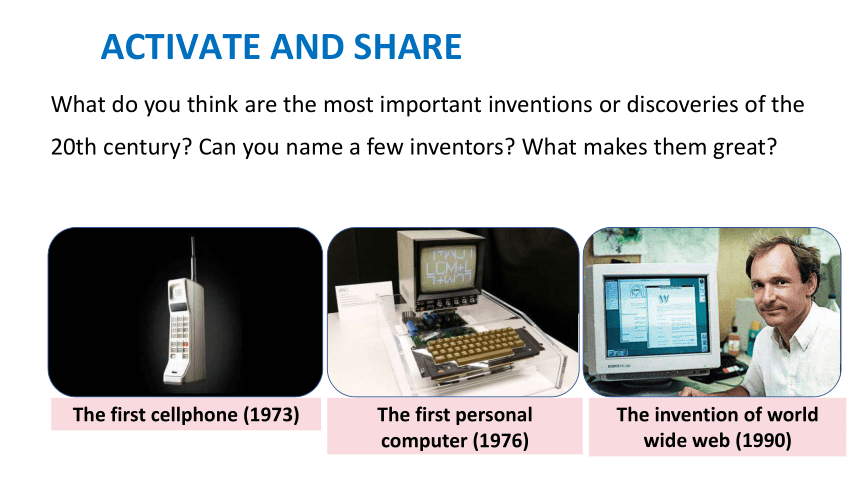
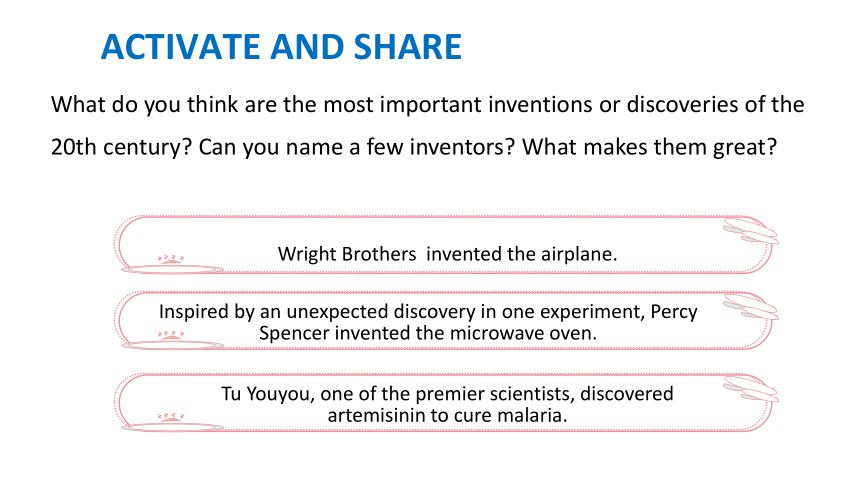
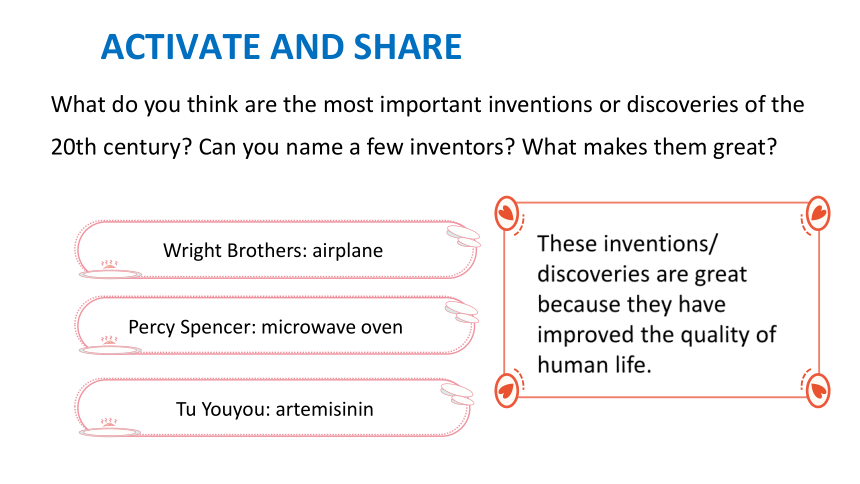
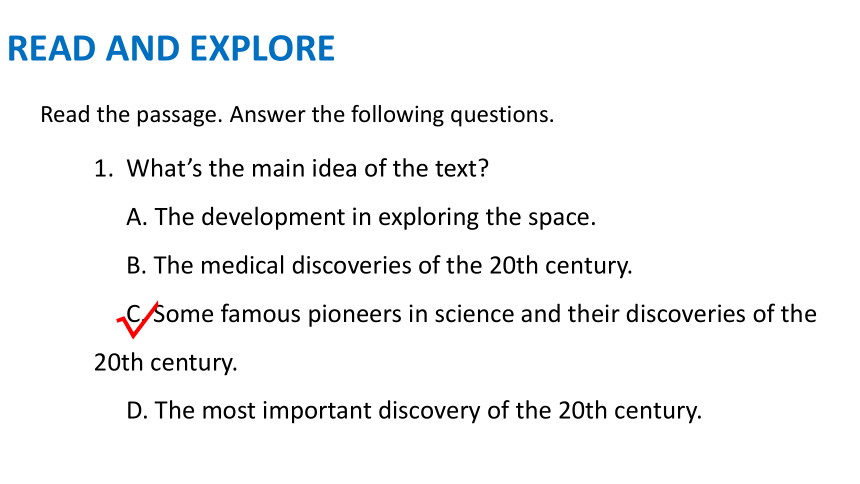
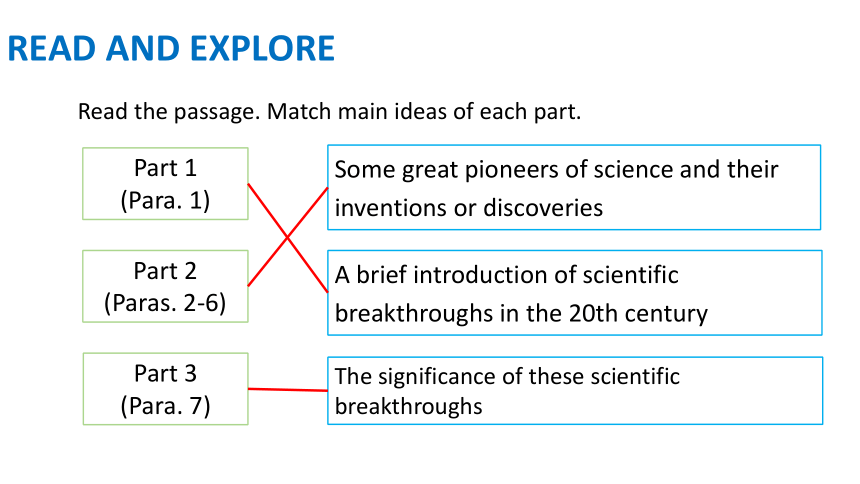
文档简介
LESSON 1 SCIENTIFIC BREAKTHROUGHS
UNIT 12 INNOVATION
LEARNING OBJECTIVES
To read and talk about important inventions and discoveries of the 20th century;
To read for general understanding;
To read for specific information to understand words in context;
To understand and learn words and expressions in context;
To compare personal opinions with the ideas of others;
To write a summary of an important discovery or invention;
To learn and practise using adjectives.
KEY POINTS AND DIFFICULT POINTS
To answer the comprehension questions;
To think about important inventions and discoveries of the 20th century;
To match the discoveries or inventions with how they came about;
To struggle with complicated sentence structures;
To think critically and express opinions freely;
To compare personal opinions with the ideas of others.
LEADING IN
Do you know these inventions?
The first computer
The first airplane
ACTIVATE AND SHARE
What do you think are the most important inventions or discoveries of the 20th century? Can you name a few inventors? What makes them great?
premier scientist pioneers of the 20th century
to be committed to to be inspired by
to be proposed by to improve the quality of human life
ACTIVATE AND SHARE
The discovery of penicillin (1929)
The first television (1952)
The first computer (1946)
What do you think are the most important inventions or discoveries of the 20th century? Can you name a few inventors? What makes them great?
ACTIVATE AND SHARE
What do you think are the most important inventions or discoveries of the 20th century? Can you name a few inventors? What makes them great?
The first cellphone (1973)
The first personal computer (1976)
The invention of world wide web (1990)
ACTIVATE AND SHARE
What do you think are the most important inventions or discoveries of the 20th century? Can you name a few inventors? What makes them great?
Wright Brothers invented the airplane.
Inspired by an unexpected discovery in one experiment, Percy Spencer invented the microwave oven.
Tu Youyou, one of the premier scientists, discovered artemisinin to cure malaria.
ACTIVATE AND SHARE
What do you think are the most important inventions or discoveries of the 20th century? Can you name a few inventors? What makes them great?
Wright Brothers: airplane
Percy Spencer: microwave oven
Tu Youyou: artemisinin
These inventions/ discoveries are great because they have improved the quality of human life.
READ AND EXPLORE
Read the passage. Answer the following questions.
1. What’s the main idea of the text?
A. The development in exploring the space.
B. The medical discoveries of the 20th century.
C. Some famous pioneers in science and their discoveries of the 20th century.
D. The most important discovery of the 20th century.
√
READ AND EXPLORE
Read the passage. Match main ideas of each part.
Part 1
(Para. 1)
Part 2
(Paras. 2-6)
Part 3
(Para. 7)
A brief introduction of scientific breakthroughs in the 20th century
Some great pioneers of science and their inventions or discoveries
The significance of these scientific breakthroughs
READ AND EXPLORE
Match the discoveries or inventions (1-4) with how they came about (a-d).
1. E = mc?
2. penicillin
3. the first computer
4. the Internet
a. there was a lucky accident
b. scientists worked together as a team
c. different scientists worked on it for many years
d. a scientist was inspired
READ AND EXPLORE
Read the passage. Answer the following questions.
2. What can we infer from the first sentence in paragraph 1?
A. There are a number of important discoveries of the 20th century.
B. It is easy to choose the most important discovery of the 20th century.
C. There are few great discoveries in the 20th century.
D. Someone who will choose the discovery will be in trouble.
√
READ AND EXPLORE
Read the passage. Answer the following questions.
3. What is NOT mentioned as the discovery of human in the 20th century?
A. Space exploration.
B. Means of transport.
C. Entertainment.
D. Physics and medicine.
√
READ AND EXPLORE
Read the passage. Answer the following questions.
4. What is the author’s attitude to the pioneers and their achievements?
A. Objective. B. Admirable.
C. Indifferent. D. Skeptical.
5. Which of the following can replace the word “dedicated” in the last paragraph?
A. Devoted. B. Determined.
C. Likely. D. Experienced.
√
√
READ AND EXPLORE
Read the passage. Answer the following questions.
6. What’s the purpose of the passage?
A. To introduce Albert Einstein.
B. To introduce the process of scientific breakthroughs.
C. To introduce the major scientific discoveries in the 20th century.
D. To introduce the contributions scientists made to the world.
√
READ AND EXPLORE
Find information about how the following things were invented / discovered. Organise the information in your own way. Then describe the process in groups.
READ AND EXPLORE
Who?
E=mc2
How?
Significance?
When?
Albert Einstein, a premier scientist
He was inspired while he was rocking his one-year-old baby.
In the summer of 1905
It shows not even time,
mass or length are constant— they change according to our experience of them.
READ AND EXPLORE
Who?
penicillin
How?
Significance?
When?
Alexander Fleming,
a biologist
In 1929
A lucky accident:He left a dish of bacteria in his laboratory before holiday. When he came back, he saw a blue mould in the dish around which the bacteria had been destroyed. It was the natural form of penicillin.
It can help to cure people and save the lives of millions.
READ AND EXPLORE
Who?
computer
How?
Significance?
When?
Eckert & Mauchly
an engineer; a physicist
In 1946
In 1946, they produced
a huge machine, which was the world's first computer.
It was the world’s first computer.
READ AND EXPLORE
Who?
the Internet
How?
Significance?
When?
Two American scientists and Tim Berners-Lee
In 1990
Different scientists have been working on it for many years
It enabled computers all over the world to communicate with each other.
VOCABULARY
1. scientific
a scientific discovery 科学发现
scientific knowledge 科学知识
scientist n. 科学家 science n. 科学
scientifically adv. 科学(上)地
练习:The scientists have made great ______________ breakthroughs in the field of science.
scientific
VOCABULARY
2. donate
donate...to... 将……捐赠给……
donate blood 献血 donate organs 捐献器官
donation n. 捐赠物;捐赠 donor n. 捐赠者
make a donation to 向……捐赠
练习:Every year we ______________ many books to the children in the remote mountainous area.
donate
VOCABULARY
3. correspond
correspond with sb. 与某人通信
correspond to/ with 与……相符 correspond to 相当于
correspond development 协调发展
to correspond 符合 ; 对应 correspond problem 对应问题
练习:Although he stays abroad alone, he frequently _________________ with his friends.
corresponds
VOCABULARY
4. instant
instant coffee 速溶咖啡 instant noodles 方便面
the instant (that) 一……就……(相当于as soon as)
for an instant 一瞬间(指动作持续的时间)
in an instant 立即,马上(指动作不久将发生)
instantly adv. 立即;马上;即刻
练习:The birds flew away in all directions the ______________ they caught sight of a man coming near.
instant
VOCABULARY
5. launch
launch a communications satellite 发射通信卫星
launch an investigation 开始调查
launch an attack 发起攻击
launch out 开始新事情 ; 下水 ; 开到水深之处 ; 开始新的事情
launch on 开始; 着手 ; 对……发动进攻
练习:Another Chinese designed and built ship was recently ______________.
launched
VOCABULARY
6. constant
a constant stream of visitors 络绎不绝的游客
keep in constant contact with sb. 一直与某人保持联系
travel at a constant speed 以恒定速度行驶
constantly adv. 始终;一直;重复不断地
constancy n. 坚定不移;恒久不变
练习:We are ______________ working to improve access to the gallery and its collections displayed.
constantly
VOCABULARY
7. perceive
perceive 不能用于进行时态。
perceive notice 感知 cognize perceive 认知
perceive... as/ to be... 认为……是……
perceive that... 注意到……
perceive instinctively 直觉感到
练习:We can ______________ his sorrow and annoyance by the looks on his face.
perceive
VOCABULARY
8. outcome
v. + adv. → n.(由动词短语转化而来的合成名词)
break down 出故障 → breakdown n. 故障
break out 爆发 → outbreak n. 爆发
put out 生产,输出 → output n. 产量,输出量
come in 进来 → income n. 收入
练习:It was impossible to predict the ______________ of the election.
outcome
PRACTICE
1. The _______________ (science) is gifted in innovation and has made great contributions to our country.
2. All the _______________ (donate) money will be used to help the homeless children.
3. The function of this machine ___________________ (correspond) to that of the human brain.
4. These boys and girls jumped with joy ___________________ (instant) the chairman announced the result of the game.
scientist
donated
corresponds
instantly
PRACTICE
5. If a company _______________ (launch) a new product, it makes it available to the public.
6. Scientists are _______________ (constant) developing new technology and they make breakthroughs from time to time.
7. Adults learn what they _______________ (perceive) to be beneficial in their life situations.
8. No one could have predicted the final _______________ (outcome).
launches
constantly
perceive
outcome
SUMMARY
Read and talk about important inventions and discoveries of the 20th century;
Read for general understanding;
Read for specific information to understand words in context;
Understand and learn words and expressions in context;
Compare personal opinions with the ideas of others;
Write a summary of an important discovery or invention;
Learn and practise using adjectives.
Thank you
UNIT 12 INNOVATION
LEARNING OBJECTIVES
To read and talk about important inventions and discoveries of the 20th century;
To read for general understanding;
To read for specific information to understand words in context;
To understand and learn words and expressions in context;
To compare personal opinions with the ideas of others;
To write a summary of an important discovery or invention;
To learn and practise using adjectives.
KEY POINTS AND DIFFICULT POINTS
To answer the comprehension questions;
To think about important inventions and discoveries of the 20th century;
To match the discoveries or inventions with how they came about;
To struggle with complicated sentence structures;
To think critically and express opinions freely;
To compare personal opinions with the ideas of others.
LEADING IN
Do you know these inventions?
The first computer
The first airplane
ACTIVATE AND SHARE
What do you think are the most important inventions or discoveries of the 20th century? Can you name a few inventors? What makes them great?
premier scientist pioneers of the 20th century
to be committed to to be inspired by
to be proposed by to improve the quality of human life
ACTIVATE AND SHARE
The discovery of penicillin (1929)
The first television (1952)
The first computer (1946)
What do you think are the most important inventions or discoveries of the 20th century? Can you name a few inventors? What makes them great?
ACTIVATE AND SHARE
What do you think are the most important inventions or discoveries of the 20th century? Can you name a few inventors? What makes them great?
The first cellphone (1973)
The first personal computer (1976)
The invention of world wide web (1990)
ACTIVATE AND SHARE
What do you think are the most important inventions or discoveries of the 20th century? Can you name a few inventors? What makes them great?
Wright Brothers invented the airplane.
Inspired by an unexpected discovery in one experiment, Percy Spencer invented the microwave oven.
Tu Youyou, one of the premier scientists, discovered artemisinin to cure malaria.
ACTIVATE AND SHARE
What do you think are the most important inventions or discoveries of the 20th century? Can you name a few inventors? What makes them great?
Wright Brothers: airplane
Percy Spencer: microwave oven
Tu Youyou: artemisinin
These inventions/ discoveries are great because they have improved the quality of human life.
READ AND EXPLORE
Read the passage. Answer the following questions.
1. What’s the main idea of the text?
A. The development in exploring the space.
B. The medical discoveries of the 20th century.
C. Some famous pioneers in science and their discoveries of the 20th century.
D. The most important discovery of the 20th century.
√
READ AND EXPLORE
Read the passage. Match main ideas of each part.
Part 1
(Para. 1)
Part 2
(Paras. 2-6)
Part 3
(Para. 7)
A brief introduction of scientific breakthroughs in the 20th century
Some great pioneers of science and their inventions or discoveries
The significance of these scientific breakthroughs
READ AND EXPLORE
Match the discoveries or inventions (1-4) with how they came about (a-d).
1. E = mc?
2. penicillin
3. the first computer
4. the Internet
a. there was a lucky accident
b. scientists worked together as a team
c. different scientists worked on it for many years
d. a scientist was inspired
READ AND EXPLORE
Read the passage. Answer the following questions.
2. What can we infer from the first sentence in paragraph 1?
A. There are a number of important discoveries of the 20th century.
B. It is easy to choose the most important discovery of the 20th century.
C. There are few great discoveries in the 20th century.
D. Someone who will choose the discovery will be in trouble.
√
READ AND EXPLORE
Read the passage. Answer the following questions.
3. What is NOT mentioned as the discovery of human in the 20th century?
A. Space exploration.
B. Means of transport.
C. Entertainment.
D. Physics and medicine.
√
READ AND EXPLORE
Read the passage. Answer the following questions.
4. What is the author’s attitude to the pioneers and their achievements?
A. Objective. B. Admirable.
C. Indifferent. D. Skeptical.
5. Which of the following can replace the word “dedicated” in the last paragraph?
A. Devoted. B. Determined.
C. Likely. D. Experienced.
√
√
READ AND EXPLORE
Read the passage. Answer the following questions.
6. What’s the purpose of the passage?
A. To introduce Albert Einstein.
B. To introduce the process of scientific breakthroughs.
C. To introduce the major scientific discoveries in the 20th century.
D. To introduce the contributions scientists made to the world.
√
READ AND EXPLORE
Find information about how the following things were invented / discovered. Organise the information in your own way. Then describe the process in groups.
READ AND EXPLORE
Who?
E=mc2
How?
Significance?
When?
Albert Einstein, a premier scientist
He was inspired while he was rocking his one-year-old baby.
In the summer of 1905
It shows not even time,
mass or length are constant— they change according to our experience of them.
READ AND EXPLORE
Who?
penicillin
How?
Significance?
When?
Alexander Fleming,
a biologist
In 1929
A lucky accident:He left a dish of bacteria in his laboratory before holiday. When he came back, he saw a blue mould in the dish around which the bacteria had been destroyed. It was the natural form of penicillin.
It can help to cure people and save the lives of millions.
READ AND EXPLORE
Who?
computer
How?
Significance?
When?
Eckert & Mauchly
an engineer; a physicist
In 1946
In 1946, they produced
a huge machine, which was the world's first computer.
It was the world’s first computer.
READ AND EXPLORE
Who?
the Internet
How?
Significance?
When?
Two American scientists and Tim Berners-Lee
In 1990
Different scientists have been working on it for many years
It enabled computers all over the world to communicate with each other.
VOCABULARY
1. scientific
a scientific discovery 科学发现
scientific knowledge 科学知识
scientist n. 科学家 science n. 科学
scientifically adv. 科学(上)地
练习:The scientists have made great ______________ breakthroughs in the field of science.
scientific
VOCABULARY
2. donate
donate...to... 将……捐赠给……
donate blood 献血 donate organs 捐献器官
donation n. 捐赠物;捐赠 donor n. 捐赠者
make a donation to 向……捐赠
练习:Every year we ______________ many books to the children in the remote mountainous area.
donate
VOCABULARY
3. correspond
correspond with sb. 与某人通信
correspond to/ with 与……相符 correspond to 相当于
correspond development 协调发展
to correspond 符合 ; 对应 correspond problem 对应问题
练习:Although he stays abroad alone, he frequently _________________ with his friends.
corresponds
VOCABULARY
4. instant
instant coffee 速溶咖啡 instant noodles 方便面
the instant (that) 一……就……(相当于as soon as)
for an instant 一瞬间(指动作持续的时间)
in an instant 立即,马上(指动作不久将发生)
instantly adv. 立即;马上;即刻
练习:The birds flew away in all directions the ______________ they caught sight of a man coming near.
instant
VOCABULARY
5. launch
launch a communications satellite 发射通信卫星
launch an investigation 开始调查
launch an attack 发起攻击
launch out 开始新事情 ; 下水 ; 开到水深之处 ; 开始新的事情
launch on 开始; 着手 ; 对……发动进攻
练习:Another Chinese designed and built ship was recently ______________.
launched
VOCABULARY
6. constant
a constant stream of visitors 络绎不绝的游客
keep in constant contact with sb. 一直与某人保持联系
travel at a constant speed 以恒定速度行驶
constantly adv. 始终;一直;重复不断地
constancy n. 坚定不移;恒久不变
练习:We are ______________ working to improve access to the gallery and its collections displayed.
constantly
VOCABULARY
7. perceive
perceive 不能用于进行时态。
perceive notice 感知 cognize perceive 认知
perceive... as/ to be... 认为……是……
perceive that... 注意到……
perceive instinctively 直觉感到
练习:We can ______________ his sorrow and annoyance by the looks on his face.
perceive
VOCABULARY
8. outcome
v. + adv. → n.(由动词短语转化而来的合成名词)
break down 出故障 → breakdown n. 故障
break out 爆发 → outbreak n. 爆发
put out 生产,输出 → output n. 产量,输出量
come in 进来 → income n. 收入
练习:It was impossible to predict the ______________ of the election.
outcome
PRACTICE
1. The _______________ (science) is gifted in innovation and has made great contributions to our country.
2. All the _______________ (donate) money will be used to help the homeless children.
3. The function of this machine ___________________ (correspond) to that of the human brain.
4. These boys and girls jumped with joy ___________________ (instant) the chairman announced the result of the game.
scientist
donated
corresponds
instantly
PRACTICE
5. If a company _______________ (launch) a new product, it makes it available to the public.
6. Scientists are _______________ (constant) developing new technology and they make breakthroughs from time to time.
7. Adults learn what they _______________ (perceive) to be beneficial in their life situations.
8. No one could have predicted the final _______________ (outcome).
launches
constantly
perceive
outcome
SUMMARY
Read and talk about important inventions and discoveries of the 20th century;
Read for general understanding;
Read for specific information to understand words in context;
Understand and learn words and expressions in context;
Compare personal opinions with the ideas of others;
Write a summary of an important discovery or invention;
Learn and practise using adjectives.
Thank you
同课章节目录
- Unit 10 Connections
- Lesson 1 How Closely Connected Are We?
- Lesson 2 Community Spirit
- Lesson 3 Anne of Green Gables
- Unit 11 Conflict And Compromise
- Lesson 1 Living In a Community
- Lesson 2 Dealing with Conflict
- Lesson 3 War Memories
- Unit 12 Innovation
- Lesson 1 Scientific Breakthroughs
- Lesson 2 Aha Moment
- Lesson 3 Stephen Hawking
